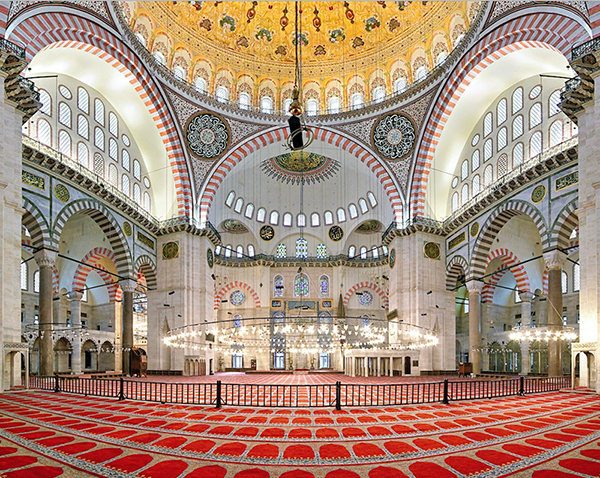
Peter Mandaville
Schar School of Policy and Government
George Mason University
Symposium on Islam and Good Governance
Muqtedar Khan (Ed.)
International Institute of Islamic Thought | October 2020
DOI: http://doi.org/10.47816/01.003.20
Muqtedar Khan’s Islam and Good Governance: A Political Philosophy of Ihsan is, above all, an expression of faith.[1] This does not mean that we should engage it as a confessional text — although it certainly is one at some level — or that it necessitates or assumes a particular faith positionality on the part of its reader. Rather, Khan seeks here to build a vision and conception of Islamic governance that does not depend on compliance with or fidelity to some outward standard — whether that be European political liberalism or madhhabi requirements. Instead, he draws on concepts, values, and virtues commonly associated with Islam’s more inward dimensions to propose a strikingly original political philosophy: one that makes worldly that which has traditionally been kept apart from the world. More specifically, Khan locates the basis of a new kind of Islamic politics within the Qur’anic and Prophetic injunction of ihsan, which implies beautification, excellence, or perfection — conventionally understood as primarily spiritual in nature. However, this is not a politics that concerns itself with domination (the pursuit, retention, and maximization of power); it is neither narrowly focused on building governmental structures that supposedly correspond with divine diktat nor understood as contestation or competition. This is, as the book’s subtitle suggests, a pathway to a philosophy of the political which defines the latter in terms of searching for the Good.
As with all new and radical ideas, there is much here that is appealing precisely because it is fresh and different, offering a welcome departure from tired as well as increasingly banal debates about, for example, the compatibility of Islam with democracy or the correct institutional form of an authentically Islamic polity. Khan is inviting us to think about the relationship between Islam and the political in completely new ways. By the same token, the sheer innovation of Islam and Good Governance leaves many questions unanswered and aspects of the argument under-theorized. In this essay, I want to both explain what is new here and how Khan’s book provides a timely new corrective to the trajectory of contemporary Islamic political thought, while also pointing out where the argument remains underdeveloped. I trust it will be understood that I approach the latter task in the full spirit of ihsan.
My own work of late has turned to the question of how we might connect contemporary Islamic thought and activism to the decoloniality paradigm associated with the work of Walter Mignolo, Catherine Walsh, and the late Aníbal Quijano.[2] As I understand it, what such a reading enables is the dismantlement of a common exceptionalism which tends to confine modern Islamic political thought within an insular impulse that has little to do with the world but everything to do with a myopic obsession with replicating Medinan normativity. This is conventionally represented as a genealogy that flows back through Rashid Rida to Muhammad Abduh to the 18th century revivalists (Shah Waliullah, Muhammad Ibn Abd al-Wahhab) and straight on back to Ibn Taymiyya in 14th century Damascus. Instead, the paradigm I wish to pursue would treat modern Islamic activism and its intellectual proponents as interventions in the global, transhistorical problematique of coloniality/decoloniality.[3] This approach proceeds from the assumption that even in this period of postcolonialism (in the sense of being chronologically posterior to the historical event of colonialism), modes of life, thought, and the political imagination all continue to be defined by colonial categories. In light of my aspiration to explore the idea of decolonial approaches to Islam, I was immediately drawn to the analysis Khan offers on pp. 193-203 in Islam and Good Governance under the heading “Four Responses to Postcolonial Reality.”

Dr. Peter Mandaville is Professor of International Affairs in the Schar School of Policy and Government at George Mason University. From 2015-2016 he served as Senior Adviser in the Secretary of State’s Office of Religion & Global Affairs at the U.S. Department of State where he led that office’s work on ISIS and sectarian conflict in the Middle East. He has also been a Nonresident Senior Fellow at the Brookings Institution and a Visiting Senior Fellow at the Pew Research Center. From 2011-12 he served as a member of former Secretary of State Hillary Clinton’s Policy Planning Staff where he helped to shape the U.S. response to the Arab Uprisings. He is the author of the books Islam & Politics (Third Edition, 2020) and Transnational Muslim Politics: Reimagining the Umma (2001) as well as many journal articles, book chapters, and op-ed/commentary pieces in outlets such as the International Herald Tribune, The Guardian, The Atlantic and Foreign Policy. He has testified multiple times before the U.S. Congress on topics including political Islam and human rights in the Middle East. His research has been supported by the John D. and Catherine T. MacArthur Foundation, the Carnegie Corporation of New York, the National Endowment for the Humanities, and the Henry Luce Foundation.
In this section, Khan offers a typology of “four distinct theoretical directions that Muslim thinkers have sought to shape the Muslim world’s postcolonial political reality.” I found his schema here to be a valuable summary of the major trends in modern Islamic political thought, and a useful reference point for specifying what is new and different about his ihsan-oriented approach. The four directions in Muslim thought that Khan identifies are the Westernizing secularism of Mustapha Kemal in Turkey and various 20th century Arab republican regimes (Tunisia, Egypt, etc.); the effort to build a specifically Islamic political order within the parameters of the modern nation-state (Rashid Rida, Abu-l Ala Maududi, Ikhwanism); the aspiration to (re)establish a centralized, transnational Islamic polity in the form of a Caliphate (Hizb ut-Tahrir, Al-Qaeda, ISIS), and the project to establish the Islamic basis of democracy (Khaled Abou El-Fadl; Abdolkarim Soroush; Abdullahi An-Naim; early Muqtedar Khan). While each of these approaches is clearly distinct, they all share something in common insofar as they aspire to either replicate or justify themselves in terms of an external standard (modernization; Shari’ah; democracy) inevitably produced by human endeavor (ijtihad, Enlightenment philosophy) but subsequently constructed as divinely normative, culturally authoritative, or some combination of the two. From Khan’s perspective, each of these can be understood in much the same way as the work of the late Fatima Mernissi — an inspiration for Khan — who revealed the historical processes through which patriarchal hegemony was retroactively encoded within Islamic sources.
It is in contrast to such trends that Khan develops his politics of ihsan. At its core is the pursuit of beautiful deeds, a concept generally understood to operate in a spiritual register or within the domain of interpersonal ethics, but which Khan seeks here to articulate in political terms. Khan’s political theorization of ihsan is informed by a thorough exploration of the classical sources and, fully understanding that ihsan represents an ethos rather than a political method, he proceeds to explicate principles of politics that, for instance, prioritize governance over government; define the muhsin (one who brings about ihsan) in light of citizenship, and propose a multifaceted conception of progressive liberation understood as istihsan (the process of bringing about ihsan). Rather than “the Islamic State,” Khan advances the State of Ihsan as the embodiment of Islamic good governance.
What is most compelling to me about this approach is its insistence on rejecting didactic hegemonies both internal and external to Islam. It is not seeking to justify Islam in terms of political liberalism or, as with some of the more facile efforts, to confirm Islam’s compatibility with democracy, pointing to a few Islamic terms (shura, ijma’) and declaring mission accomplished. At the same time, it strongly resists the idea that classical jurisprudence mandates a specific model of Islamic government whose contours are prescribed by Shari’ah. Rather, it is striving to lead Muslims away from dead ends within and outside their tradition, while offering a new political ethos that associates ihsan with the pursuit of ethical governance. Some may sense in his approach shades of an updated Islamization of Knowledge paradigm (à la Ismail Al-Faruqi) that posits a conventional liberal policy discourse on good governance (transparency, accountability, equity) and “Islamizes” it by throwing in some religiously-inflected terminology. Such a reading would be unfair, however, as Khan clearly has broader normative horizons in mind. He is not looking to superficially “convert” existing domains of knowledge to Islam but rather inviting Muslims to consider fundamentally different sources of political ethics within their tradition.
Nonetheless, my questions and concerns about Khan’s ihsan paradigm arise from the fact that I am primarily a scholar of Islamic social and political movements and, more specifically, someone interested in how Islamic political thought gets translated into political action and activism. I am, therefore, naturally led to ask how we get from a political philosophy of ihsan to the political praxis of ihsan. To be fair, Khan is not entirely silent on this issue. Islam and Good Governance, particularly in its closing sections, does indeed describe aspects and qualities of practice for the muhsin: citizenship, legislation, and policymaking. Yet it is not entirely clear to me how one would transform ihsan the ethos into ihsan the political project. Conscious of the concept’s strong associations with Sufism, Khan is very clear that he is not suggesting all Muslims become Sufis in order to enable ihsan. He is clearly aware — and wary — of the sharply hierarchical and sometimes authoritarian practices present within organized (rigidly tariqat) Sufism. So, then, what are the mechanisms through which ihsan politics become enacted or enter the world? Is this a story of how reflection and re-orientation at the individual level eventually scale to aggregate effect? Are there societal or political conditions that Khan sees as conducive to encouraging Muslims to recognize the possibilities inherent in ihsan? Are there concrete and specific examples that might illustrate to a broad constituency how embracing ihsan as the north star of Islamic politics can deliver tangible public good? Islam and Good Governance has a fascinating — but, I feel, ultimately underdeveloped — section on justice (pp. 222-226) in which Khan bemoans the gradual disappearance of an emphasis on justice (‘adl) as Sunni jurisprudence evolves through the medieval period. Given the centrality of socioeconomic and other forms of structural inequality in shaping domestic and global politics, I want to know more about how Khan’s paradigm would reconceptualize ‘adl in our time. For instance, what does ihsan as praxis mean for Black American Muslims?
My hope is that Islam and Good Governance will generate many difficult but ultimately transformative discussions. This is a book that doesn’t just rock the boat but rather sends the ship back to dry-dock for a fundamental overhaul. The challenge will lie in helping its would-be passengers to see a craft that is not only seaworthy but also capable of navigating the increasingly turbulent waters of humanity’s near future.
END NOTES
[1] M. A. Muqtedar Khan, Islam and Good Governance: A Political Philosophy of Ihsan, New York: Palgrave Macmillan, 2019.
[2] Walter D. Mignolo and Catherine E. Walsh, On Decoloniality: Concepts, Analytics, Praxis, Durham: Duke University Press, 2018; Aníbal Quijano, “Coloniality of Power, Eurocentrism, and Latin America,” Nepantla: Views from South, Vol. 1, No. 3, 2000, pp. 533-580.
[3] For an initial statement of these ideas, see Peter Mandaville, “Global Jihadism, Subalternity and Urban Islam in the West” in Jeevan Deol and Zaheer Kazmi (eds.), Contextualizing Jihadi Thought, Oxford: Oxford University Press, 2012.
